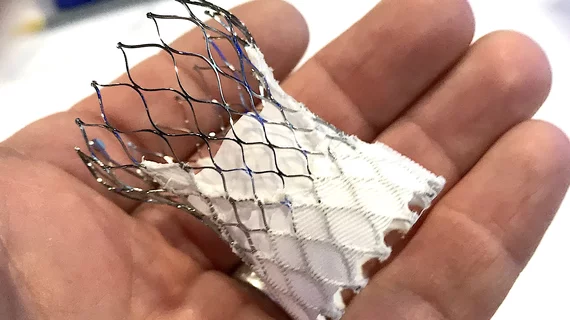Medtronic and Abbott both released updated data on their transcatheter aortic valve replacement (TAVR) solutions during late-breaking sessions at CRT 2023, the annual Cardiovascular Research Technologies meeting, in Washington, D.C.
Medtronic at CRT 2023
Medtronic’s update, presented on Feb. 27, focused on the durability of the company’s CoreValve/Evolut TAVR platform. The late-breaking study focused on data from more than 1,100 TAVR patients and nearly 1,000 surgical aortic valve replacement (SAVR) patients.
Overall, bioprosthetic valve dysfunction (BVD) occurred less frequently among TAVR patients treated with CoreValve/Evolut devices (7.8%) than it did among SAVR patients (14.2%). Also, after five years, structural valve deterioration (SVD) was seen in 2.2% of TAVR patients and 4.4% of SAVR patients.
In addition, researchers reported, TAVR was linked to a lower rate of severe prosthesis-patient mismatch after 30 days than SAVR and comparable rates of thrombosis and endocarditis.
“These extraordinary results reinforce the hemodynamic durability and valve performance of the CoreValve/Evolut system and demonstrate again that Evolut is a safe and effective alternative to surgery,” Nina Goodheart, senior vice president and president of Medtronic’s structural heart & aortic business, said in a prepared statement.
“These results add yet another proof point demonstrating the durability benefits of TAVR compared to surgery when it comes to bioprosthetic valve dysfunction—a complication that can impact the durability and performance of a critical valve replacement,” added Steven J. Yakubov, MD, system chief of structural heart disease at OhioHealth Riverside Methodist Hospital. “With valve durability becoming more critical as TAVR expands to younger, healthier patients, this analysis underscores the long-term promise of this minimally invasive approach and should be taken into consideration during initial valve selection.”
Abbott at CRT 2023
Abbott’s TAVR update, presented Feb. 28 at CRT 2023, focused on its new self-expanding Navitor system, which just gained U.S. Food and Drug Administration approval back in January. The late-breaking PORTICO NG study found that the Navitor TAVR device was associated with a procedural success rate of 97%, an all-cause mortality rate of 1.9%, a disabling stroke rate of 1.9% and zero patients presenting with moderate or greater paravalvular leak after 30 days.
Michael Reardon, MD, chair of cardiovascular research and a professor of cardiothoracic surgery at Houston Methodist Hospital, has extended experience with the Navitor valve. In a prepared statement from Abbott, he commented on these early results from the PORTICO NG study.
“Abbott's Navitor device offers a minimally invasive treatment option for severe aortic stenosis that can be lifesaving,” Reardon said. “The trial provides promising results on the safety and effectiveness of Navitor in addressing this common heart valve disease, highlighting a reduction in the backflow of blood around the valve due to the system's design.”
Additional details about CRT 2023 are available here.

